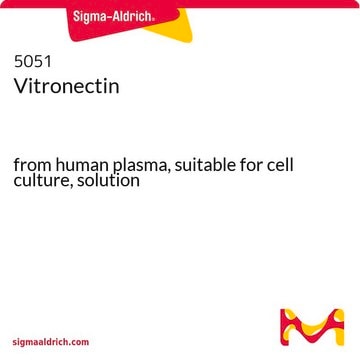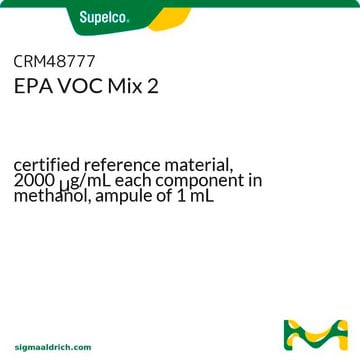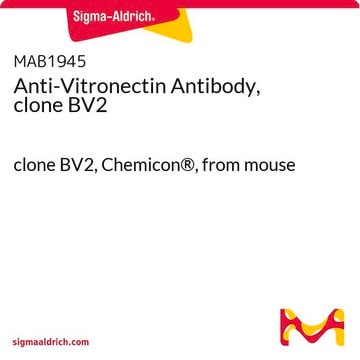V7881
Monoclonal Anti-Vitronectin antibody produced in mouse
clone VIT-2, ascites fluid
About This Item
Productos recomendados
biological source
mouse
Quality Level
conjugate
unconjugated
antibody form
ascites fluid
antibody product type
primary antibodies
clone
VIT-2, monoclonal
mol wt
antigen 65-75 kDa
contains
15 mM sodium azide
species reactivity
human
technique(s)
indirect ELISA: suitable
indirect immunofluorescence: suitable using human cultured fibroblasts
microarray: suitable
western blot: 1:2,500 using a denatured and reduced preparation of purified human plasma vitronectin
isotype
IgM
UniProt accession no.
shipped in
dry ice
storage temp.
−20°C
target post-translational modification
unmodified
Gene Information
human ... VTN(7448)
Categorías relacionadas
General description
Specificity
Immunogen
Application
- immunocytochemisry
- western blotting
- immunoprecipitation
- immunofluorescence
- enzyme-linked immunosorbent assay (ELISA)
Biochem/physiol Actions
Disclaimer
¿No encuentra el producto adecuado?
Pruebe nuestro Herramienta de selección de productos.
Storage Class
10 - Combustible liquids
wgk_germany
nwg
flash_point_f
Not applicable
flash_point_c
Not applicable
Certificados de análisis (COA)
Busque Certificados de análisis (COA) introduciendo el número de lote del producto. Los números de lote se encuentran en la etiqueta del producto después de las palabras «Lot» o «Batch»
¿Ya tiene este producto?
Encuentre la documentación para los productos que ha comprado recientemente en la Biblioteca de documentos.
Nuestro equipo de científicos tiene experiencia en todas las áreas de investigación: Ciencias de la vida, Ciencia de los materiales, Síntesis química, Cromatografía, Analítica y muchas otras.
Póngase en contacto con el Servicio técnico








